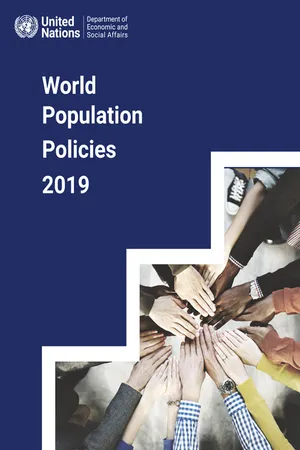
World Population Policies 2019
- 286 pages
- English
- PDF
- Only available on web
World Population Policies 2019
About This Book
The 2019 edition of the World Population Policies report, a report published biennially since 2003, focuses on Government policies and programmes on international migration. It provides an overview of policies to govern regular migration and to address irregular migration, and reviews an array of policy measures related to migrants' rights, including access to services, as well as policies to foster the integration of migrants into host societies. The report also examines Government measures to maximise the development impacts of migration and to support diasporas. The 2019 World Population Policies report presents the official Government responses to the module on international migration (module III) of the United Nations Twelfth Inquiry among Governments on Population and Development (the "Inquiry"). The Population Division has been implementing the Inquiry every five years since 1963 as part of its mandate to systematically monitor population policies at the international level.
Frequently asked questions
Information
Table of contents
- Table of contents
- Foreword
- Explanatory notes
- Abbreviations
- Overview
- Chapter 1. Trends and challenges in the global economy
- Chapter 2. Issues at stake
- Chapter 3. A road map for global growth and sustainable development
- Chapter 4. Making debt work for development
- Chapter 5. Making private capital work for development
- Chapter 6. Making banks work better for development